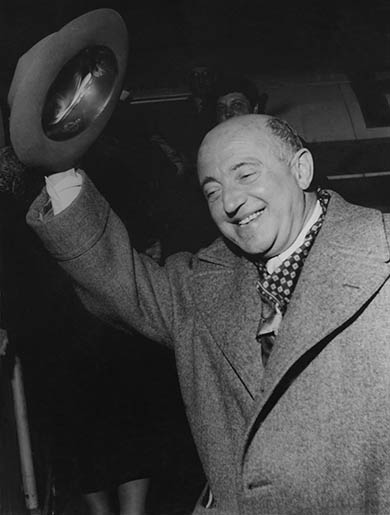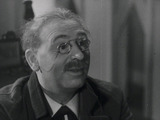Max Ophüls(Max Oppenheimer)
Max Ophüls(Max Oppenheimer)
Den Film schafft der Regisseur. Da genügt es nicht, sein Handwerk zu können, Kenntnisse, Geschmack, Geschick im Umgang mit Schauspielern zu haben. Ein Filmregisseur, der nicht zugleich Dichter ist, kann nichts Großes leisten. Film ist Schöpfung aus dem Nichts, jede Sekunde wird alles neu geschaffen […].
[It is the director who makes the film. It is not enough to have mastery of your craft, to be knowledgeable, tasteful and skilled enough in dealing with actors. A film director who is not also a poet, will not produce anything great. Making a film is forging something from nothing, every second is created from scratch [...]. (ed. trans.)]
Max Ophüls in an interview with the Züricher Tages-Anzeiger, 3 April 1941
| Born | on 6 May 1902 in Saarbrücken |
|---|---|
| Died | on 26 March 1957 in Hamburg |
| Exile | France, United States of America |
| Remigration | Federal Republic of Germany |
| Profession | Actor, Theater director, Film director |
Saarbrücken-born Max Ophüls was regarded as a poet among directors on the strength of his sensitive literary adaptations. He began his career as a 19 year-old theatre actor and gained experience in directing and in broadcasting from an early stage. In 1925/26 he staged productions at the Vienna Burgtheater, and was then engaged in Frankfurt am Main, Wroclaw and Berlin where he came into contact with film for the first time in 1931. That same year, he made his first short feature film Dann schon lieber Lebertran, which was quickly followed by the first German talkie opera Die verkaufte Braut (1932) and the internationally acclaimed film adaptation of Arthur Schnitzler's Liebelei (1932-33), which paved the way for his period of exile in France. Ophüls left Germany shortly after the Nazis came to power, encountering many colleagues in Paris who had also fled, including producers who enabled him to work there. From 1933 to 1940, Ophüls directed at least one film per year in various European countries. De Mayerling à Sarajevo (1939/40), a pacifist plea set against a historic backdrop, was overtaken by political events. After the occupation of France, the artist, who had been a French citizen since 1938, fled first to Switzerland and then to the United States. There he wrote anti-Nazi radio programmes for "Voice of America"; he only managed to resume film directing in the post-war period. In 1949 Ophüls returned to France.
Further reading:
Weniger, Kay: „Es wird im Leben dir mehr genommen als gegeben…“ Lexikon der aus Deutschland und Österreich emigrierten Filmschaffenden 1933 bis 1945. Eine Gesamtübersicht. Hamburg: Acabus 2011, S. 375ff.
Asper, Helmut G.: Max Ophüls. Eine Biografie mit zahlreichen Dokumenten, Texten und Bildern. Berlin: Bertz 1998
Major works:
Die verkaufte Braut (1932)
Liebelei (1932/33)
Werther (1938)
De Mayerling à Sarajevo (1939/40)
Letter from an Unkown Woman (1947)
Caught (1948)
Der Reigen (1950)
Lola Montez (1955)


